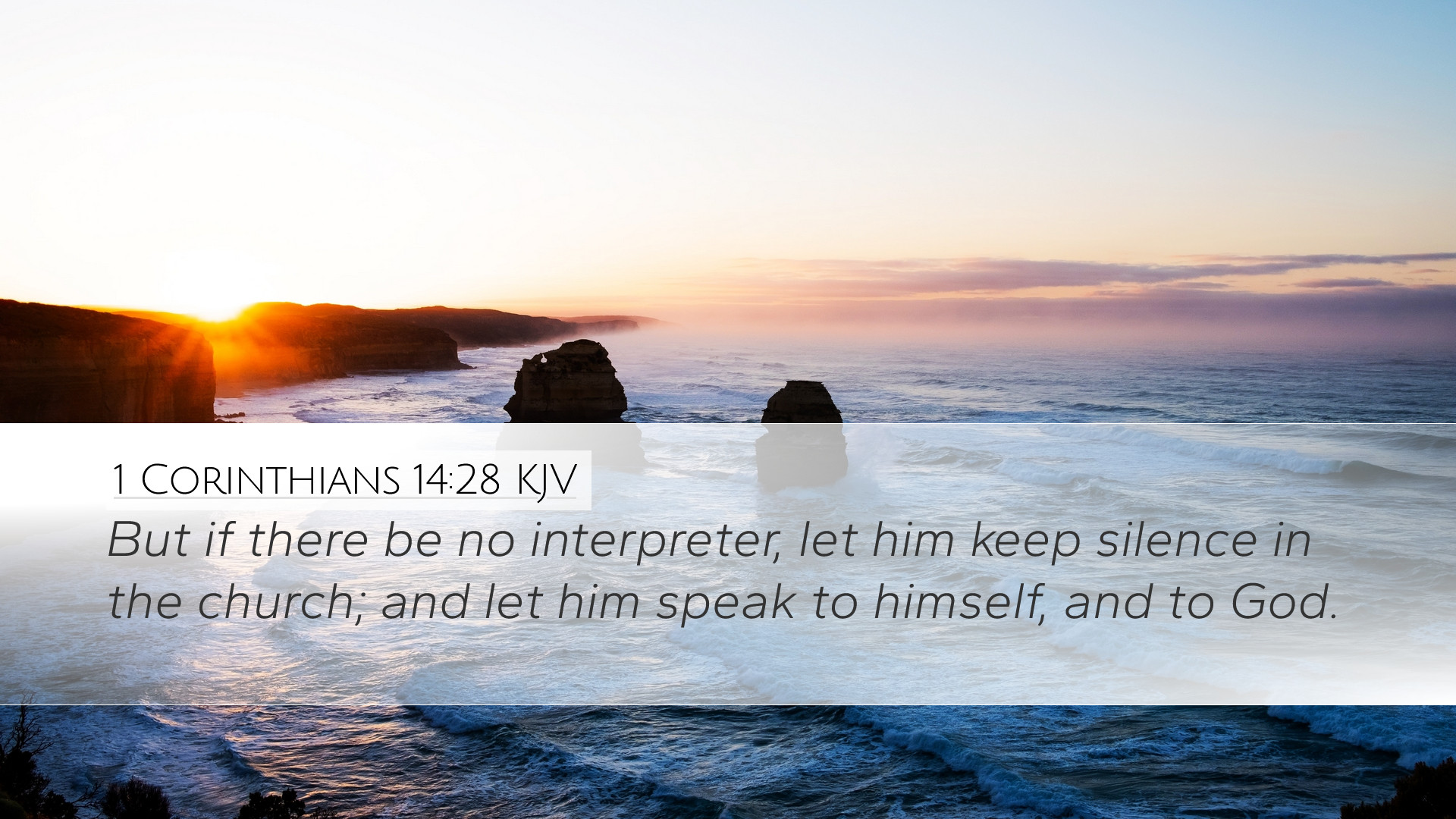Commentary on 1 Corinthians 14:28
Text of the Verse: "But if there be no interpreter, let him keep silence in the church; and let him speak to himself, and to God." (1 Corinthians 14:28)
Introduction
This instruction by the Apostle Paul addresses the practice of speaking in tongues within the assembly of believers. It underscores the necessity of order and understanding in worship so that the church may be edified and God glorified. Various public domain commentaries provide insights into the implications of this verse for the church community, particularly regarding the gift of tongues and the role of interpretation.
Exegesis of the Verse
In this verse, Paul establishes a protocol for speaking in tongues: it must be accompanied by interpretation. Without an interpreter, the speaker is advised to remain silent. This directive emphasizes the priority of intelligibility in worship, where all actions should build up the body of Christ.
Matthew Henry's Commentary
Matthew Henry emphasizes that the practice of speaking in tongues, while legitimate, should not disrupt the orderly conduct of worship. He notes that the presence of an interpreter is crucial for the edification of others. Henry articulates that silence is preferable when no interpreter is available, suggesting that the gift of tongues, without understanding, benefits no one. He concludes that speaking to oneself and to God is still a form of worship that maintains a proper heart posture even in silence.
Albert Barnes' Commentary
Albert Barnes approaches the verse with clarity on the function of spiritual gifts. He explains that the church is meant to function harmoniously, and that all spiritual expressions must serve the common good. Barnes identifies silence as a form of wisdom and obedience to the divine order, and highlights the importance of communication with God even when one is not publicly expressing it. The verse serves as a reminder of the personal relationship believers have with God, which continues even in moments of silence.
Adam Clarke's Commentary
Adam Clarke provides a detailed analysis of the implications of silence in the church. He argues that Paul was combating disorderly practices in the Corinthian assembly, where speaking in tongues was misused or executed without due consideration for others. Clarke underscores that private worship is still valuable; in fact, it can deepen one's communion with God. He notes that speaking to oneself can be a vital spiritual exercise, promoting personal reflection and prayer even when public expression is restricted.
Theological Implications
This verse binds together several theological principles critical to understanding the role of spiritual gifts in the church. Key implications include:
- Order in Worship: Paul advocates for orderly worship where intelligibility prevails, preventing confusion and fostering an environment conducive to growth.
- Edification of the Church: The overarching goal of all spiritual gifts, including speaking in tongues, is the edification of the church (1 Corinthians 14:12). If a gift does not serve this purpose, its public exercise should be curtailed.
- Personal Relationship with God: The directive to speak to oneself and God reflects the importance of personal devotion and private worship, even when corporate expressions of faith are limited.
Practical Applications
The insights from this verse and the commentaries have several applications for contemporary church leadership and congregational life:
- Encouraging Interpretation: Churches should encourage the practice of interpretation alongside speaking in tongues to ensure that worship is comprehensible and edifying.
- Promoting Silence: Silence, when necessary, can be powerful. Churches might incorporate times of silent prayer or reflection to deepen congregational worship experience.
- Fostering Personal Devotion: Encourage members to pursue personal connection with God, reinforcing that their relationship with Him is ongoing, regardless of public worship settings.
Conclusion
1 Corinthians 14:28 serves as a crucial reminder for the church to prioritize order, understanding, and edification in worship. Through the insights from Matthew Henry, Albert Barnes, and Adam Clarke, we see not just the parameters of public worship but also the value of personal relationship with God. As churches navigate the complexities of spiritual gifts, may they glorify God through intentional practices that uplift the congregation and cultivate deep connections among believers.


